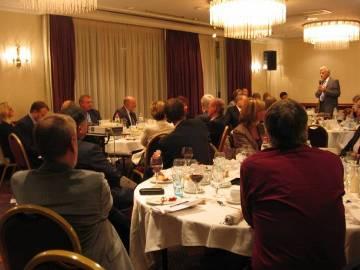A recent survey from Sermo, the social networking site for physicians, found that topics such as multiple sclerosis treatment, pain management, bipolar disorder and reimbursement issues are likely to bring a doctor to a pharma-sponsored dinner meeting. Topics requested by physician’s also included anti-platelet and anticoagulant drugs and practice management.
Additionally, physicians said they wanted drug information with respect to:
- Comparative data
- Latest clinical trials; and
- Technical updates vs. the drug’s availability and utility
The survey also showed that doctors preferred meetings to be brief and to have plenty of time for questions. The survey asked physicians to share their perspective on:
- Pharmaceutical dinner programs at medical conferences and other venues
- Preferred topics of discussion at these meetings
- The impact of pharmaceutical company transparency sites.
The survey had a total of 100 votes, including 73 specialists and 27 primary care physicians. 74% of physician respondents said they attend Speaker Programs at medical conferences, 14% higher than attendance at traditional programs.
According to an article discussing the survey results, “speaker programs were popular among most of the survey respondents: almost three-fourths attend dinner meetings at medical conferences, while 62% participate in traditional programs.”
Still, only 27% actually avoid speaker programs because of the industry’s transparency push; several pharmaceutical manufacturers are now reporting all payments to doctors, including free meals.
Doctors who responded to the survey said they enjoy Q-and-A sessions and “spirited discussions” that can follow speakers’ formal presentations. One pediatrician also enjoyed playing “stump the speaker,” saying “I like to challenge the claims of the drug companies and force the speaker to send me more information when I don’t think we are getting the whole story.”
Time is also of the essence: “I like a good speaker who gets right to the subject at hand and can say it in no more than 45-60 minutes,” one cardiologist said. “I can say that I walk away with at least one new fact” after every meeting, one pleased neurologist said.
In fact, almost one-quarter (23%) of doctors said they’d like to get drug information from more dinner meetings. But the majority would like other sources, too:
- 21% said they’d like to receive peer-reviewed journal articles;
- 20% would like to view an online presentation rather than a live speech; and
- 14% want to get their pharmacy information from online e-detailing.
Ultimately, the survey showed that physicians overall value the use of dinner meetings sponsored by industry. This kind of research should be expanded to get a larger sample and idea of what physicians want out of educational dinner programs. Accordingly, companies should use the data from this survey to tailor their programs to the request of physicians so that physicians can get the most value out of such educational programs and improve patient care.


